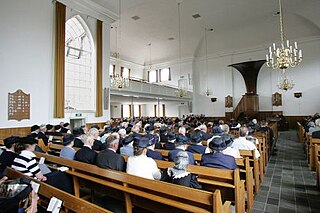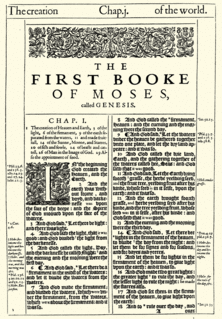
Evangelicalism, also called evangelical Christianity, or evangelical Protestantism, is a worldwide trans-denominational movement within Protestant Christianity that maintains the belief that the essence of the Gospel consists of the doctrine of salvation by grace alone, solely through faith in Jesus' atonement. Evangelicals believe in the centrality of the conversion or "born again" experience in receiving salvation, in the authority of the Bible as God's revelation to humanity, and in spreading the Christian message. The movement has long had a presence in the Anglosphere before spreading further afield in the 19th, 20th and early 21st centuries.

A Christian denomination is a distinct religious body within Christianity that comprises all church congregations of the same kind, identifiable by traits such as a name, peculiar history, organization, leadership, theological doctrine, worship style and sometimes a founder. It is a secular and neutral term, generally used to denote any established Christian church. Unlike a cult or sect, a denomination is usually seen as part of the Christian religious mainstream. Most Christian denominations self-describe as Churches, whereas some newer ones tend to use the terms churches, assemblies, fellowships, etc., interchangeably. Divisions between one group and another are defined by authority and doctrine; issues such as the nature of Jesus, the authority of apostolic succession, biblical hermeneutics, theology, ecclesiology, eschatology, and papal primacy may separate one denomination from another. Groups of denominations—often sharing broadly similar beliefs, practices, and historical ties—are sometimes known as "branches of Christianity". These branches differ in many ways, especially through differences in practices and belief.

The following outline is provided as an overview of and topical guide to Christian theology:
A Protestant/Evangelical Youth ministry is a Christian ministry intended to instruct and disciple youths in what it means to be a Christian, how to mature as a Christian, and how to encourage others to claim Jesus as their Saviour through evangelism and apologetics. This is accomplished through teaching, relationship building and/or mentoring. Youth ministries may vary widely depending on their denomination, size, liberal or conservative outlook and geographic location. The ministries themselves are almost always built on relationships between the youth minister and the student and their shared perception of their relationship to God. Youth have become an integral part of nearly every church’s ministry programming, and youth ministries continue to have a profound impact on the societies in which they exist.
Transformational Christianity, or Transformationalism, represents a fusion of evangelicalism, Pentecostalism, and ecumenism that started becoming prominent in the early 21st century. Unlike previous movements, it is typically embodied in regional meta-church organizations—alliances of churches from different denominational backgrounds—rather than particular churches, denominations, or parachurch organizations. Critics of Transformationalism accuse it of overemphasizing eschatology, false dichotomies, unnecessary idealism and a tendency to be corrosive of individual church identities.
Parachurch organizations are Christian faith-based organizations that work outside and across denominations to engage in social welfare and evangelism. Parachurch organizations seek to come alongside the church and specialize in things that individual churches may not be able to specialize in by themselves. They often cross denominational and national boundaries providing specialized services and training.

In Christian theology, ecclesiology is the study of the Church, the origins of Christianity, its relationship to Jesus, its role in salvation, its polity, its discipline, its eschatology, and its leadership.

A Christian mission is an organized effort to spread Christianity to new converts. Missions involve sending individuals and groups across boundaries, most commonly geographical boundaries, to carry on evangelism or other activities, such as educational or hospital work. Sometimes individuals are sent and are called missionaries. When groups are sent, they are often called mission teams and they do mission trips. There are a few different kinds of mission trips: short-term, long-term, relational and those that simply help people in need. Some people choose to dedicate their whole lives to mission. Missionaries preach the Christian faith, and provide humanitarian aid. Christian doctrines permit the provision of aid without requiring religious conversion. However, Christian missionaries are implicated in the genocide of indigenous peoples. Around 100,000 native people in California, U.S., or 1/3 of the native population, are said to have died due to missions. Additionally, Christian missions are implicated in the Rwandan Genocide, with Christian missions hardening ethnic divisions in Rwanda and displaying favoritism of one of more ethnic groups.

Liberal Christianity, also known as liberal theology, is a movement that interprets and reforms Christian teaching by taking into consideration modern knowledge, science and ethics. It emphasizes the importance of reason and experience over doctrinal authority. Liberal Christians view their theology as an alternative to both atheistic rationalism and theologies based on traditional interpretations of external authority.
In Christianity, ministry is an activity carried out by Christians to express or spread their faith, the prototype being the Great Commission. The Encyclopedia of Christianity defines it as "carrying forth Christ's mission in the world", indicating that it is "conferred on each Christian in baptism." It is performed by most Christians. This is distinguished from the "office of minister", to which specific individuals who feel a certain vocation. It can signify this activity as a whole, or specific activities, or organizations within a church dedicated to specific activities. Some ministries are identified formally as such, and some are not; some ministry is directed towards members of the church, and some towards non-members. See also Apostolates.

A church is a religious organization or congregation that meets in a particular location. Many are formally organized, with constitutions and by-laws, maintain offices, are served by clergy or lay leaders, and, in nations where this is permissible, often seek non-profit corporate status.
In Christian theology, a sodality, also known as a syndiakonia, is a form of the "Universal Church" expressed in specialized, task-oriented form as opposed to the Christian church in its local, diocesan form. In English, the term sodality is most commonly used by groups in the Anglican Communion, Catholic Church, Eastern Orthodox Church, Lutheran Church and Reformed Church, where they are also referred to as confraternities. Sodalities are expressed among Protestant Churches through the multitude of mission organizations, societies, and specialized ministries that have proliferated, particularly since the advent of the modern missions movement, usually attributed to Englishman William Carey in 1792.

Catholicity is a concept pertaining to beliefs and practices widely accepted across numerous Christian denominations, most notably those that describe themselves as Catholic in accordance with the Four Marks of the Church, as expressed in the Nicene Creed of the First Council of Constantinople in 381: "[I believe] in one, holy, catholic, and apostolic Church."

Christian universalism is a school of Christian theology focused around the doctrine of universal reconciliation – the view that all human beings will ultimately be saved and restored to a right relationship with God. Christian universalism and the belief or hope in the universal reconciliation through Christ can even be understood as synonyms.

Protestants in Thailand constitute about 0.77% of the population of Thailand. Protestant work among the Thai people was begun by Ann Judson in Burma, who evangelized Thai war captives who were relocated to Burma. Protestantism was introduced to the country of Thailand in 1828 through the work of Karl Gutzlaff and Jacob Tomlin, the first two resident Protestant missionaries in Thailand.

Christianity is the main religion in Angola. There are about 1,000 religious communities in the country, most of which are Christian. Roman Catholics constitute about half of the population. Other Christian denominations include Baptists, Methodists, Congregationalists, Lutherans, Reformed Churches and Seventh-day Adventists and Jehovah's Witnesses − all these denominations making up about a quarter of the population. Since independence, numerous Pentecostal, Evangelical and other communities have sprung up, the most important being the Igreja Universal do Reino de Deus, of Brazilian origin. Two syncretic "African Kala Christian" churches exist, the Kimbanguists who have their origin in what is the present-day Democratic Republic of Congo, and the indigenous Tokoist faith. There is also a small Muslim minority, consisting of Sunni immigrants from a diversity of African and other countries, who do not form a community. Some Angolans − mostly in remote rural societies − currently profess African Traditional Religions, but traditional beliefs subsist among a substantial part of those who have become Christians.

17th-century Missionary activity in Asia and the Americas grew strongly, put down roots, and developed its institutions, though it met with strong resistance in Japan in particular. At the same time Christian colonization of some areas outside Europe succeeded, driven by economic as well as religious reasons. Christian traders were heavily involved in the Atlantic slave trade, which had the effect of transporting Africans into Christian communities. A land war between Christianity and Islam continued, in the form of the campaigns of the Habsburg Empire and Ottoman Empire in the Balkans, a turning point coming at Vienna in 1683. The Tsardom of Russia, where Orthodox Christianity was the established religion, expanded eastwards into Siberia and Central Asia, regions of Islamic and shamanistic beliefs, and also southwest into the Ukraine, where the Uniate Eastern Catholic Churches arose.
Fedric Anilkumar is a Theologian who teaches at the Karnataka Theological College, Mangalore, a Seminary established in 1965 and affiliated to the nation's first University, the Senate of Serampore College (University).






